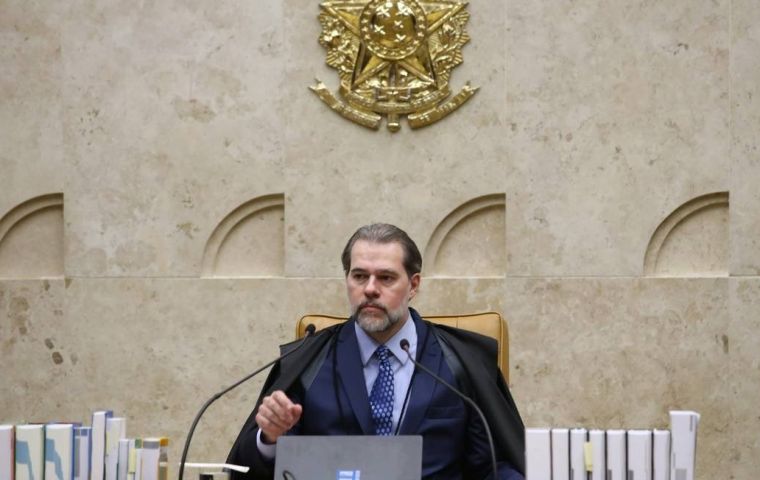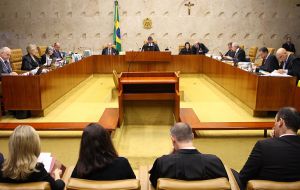MercoPress. South Atlantic News Agency
Transparency International blasts Brazilian Justice for violating freedom of expression
 Last month the president of the court, Dias Toffoli, initiated a secretive investigation into ‘fake news’ and threats to the STF and its members
Last month the president of the court, Dias Toffoli, initiated a secretive investigation into ‘fake news’ and threats to the STF and its members  The investigation was widely criticized as an abuse of authority and unconstitutional, including by Transparency International Brazil
The investigation was widely criticized as an abuse of authority and unconstitutional, including by Transparency International Brazil A decision by Brazil’s Supreme Federal Court (STF) to demand the suppression of a media report concerning one of the court’s sitting judges violates the freedom of the press, warns Transparency International Brazil. The demand to remove the report from the internet is unacceptable, risks the international image of Brazil and goes against fundamental principles of the democratic rule of law.
Unless the decision is immediately reversed, the STF risks setting a precedent for a serious regression in the rule of law and defense of liberties in the country.
Last month the president of the court, Dias Toffoli, initiated a secretive investigation into ‘fake news’ and threats to the STF and its members. The investigation was widely criticized as an abuse of authority and unconstitutional, including by Transparency International Brazil.
The court has used this investigation to justify the move to censor the article concerning the STF judge. Last month, Toffoli said, “I have always said that there is no democratic rule of law, no democracy, without an independent judiciary and a free press. This Federal Supreme Court has always acted in defense of freedoms and especially of freedom of the press and of a free press.”
This week’s news contradicts this statement and confirms fears about the risks of arbitrariness in this secret investigation, as well as the merged roles of investigators, prosecutors and judges. The decision also sets a serious and dangerous precedent, threatening journalists who dare to publish reports involving members of the court with censorship and inquisitorial persecution – both of which have been abolished within the Brazilian legal system.
The systematic, organized, and intentional dissemination of fake news is one of the greatest threats to democracy today. However, it must be countered using regular judicial procedures. If the STF’s secretive ‘fake news’ investigation continues in its current form, it risks of threatening more freedoms than it curbs crimes.




Top Comments
Disclaimer & comment rules-

-

Read all comments”Federal Supreme Court ( STF ) on Tuesday to determine the filing of a classified investigation that investigates false reports and attacks on the court itself and its members.
Apr 19th, 2019 - 01:25 am 0The investigation generated controversy in the legal community and was not considered unanimous among the ministers of the Court itself. The initiative, however, received support from entities such as the Association of Brazilian Magistrates (AMB) and the Brazilian Bar Association (OAB).
The investigation was opened by means of an ordinance, and not at the request of the Attorney General's Office (PGR), as is the practice. Although unusual, the situation is predicted in the Internal Rules of the Supreme Court.“
https://oglobo.globo.com/brasil/analise-dodge-entra-na-guerra-contra-supremo-23603757
Fair comment is always allowed. But opinions given as libel when unprovable are not. As the constitution allows for such remedies for the victimised.
Freedom of speech isn't absolute as. ”The idea of falsely shouting “fire” in a crowded theatre arose from the Supreme Court's 1919 decision in the case Schenck v. United States. The Court ruled unanimously that the First Amendment, though it protects freedom of expression, does not protect dangerous speech.”
@Terence Hill
Apr 19th, 2019 - 06:32 am 0Fair comment is always allowed
REF: “violating freedom of expression”:
Maybe, Venezuela is an excellent example to follow?
https://en.mercopress.com/2019/04/15/maduro-increasing-the-civilian-militia-by-a-million-to-three-million-by-end-of-2019
Commenting for this story is now closed.
If you have a Facebook account, become a fan and comment on our Facebook Page!